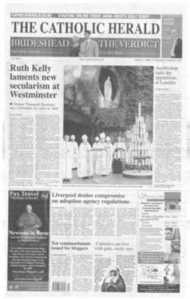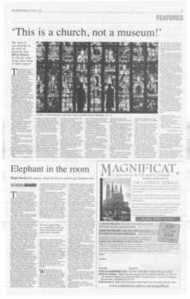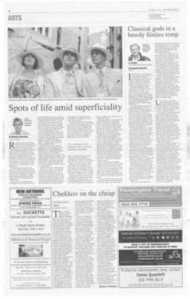Page 4, 3rd October 2008
Page 4

Report an error
Noticed an error on this page?If you've noticed an error in this article please click here to report it.
Tags
Share
Related articles
Unity Through Our Lady
Cardinal Shakes Off Crisis To Voice Ecumenical Hopes
Hume Maps Out Unity Road
Heads Of 30 Churches Join Cardinal Hume For Service
Christian Churches Find Unity Over Mary
Cardinal: Our Lady will lead us to unity
BY INMACULADA ALVAREZ IN LOURDES, FRANCE
DEVOTION to the Virgin Mary has an essential role in ecumenical dialogue and the journey to full and visible unity among Christians, a senior Vatican official has told Anglican pilgrims to Lourdes.
Cardinal Walter Kasper, the president of the Pontifical Council for Promoting Christian Unity, made his remarks during an ecumenical celebration in Lourdes. "Lourdes is known for its miracles," Cardinal Kasper said. "Who would have imagined, only 20 or 30 years ago. that Catholics and Anglicans would go on pilgrimage and pray together?
"For those who are familiar with the debates and controversies of the past on Mary. between Catholics and nonCatholic Christians, for those who know the reservations of the non-Catholic world toward Marian pilgrimage sites, for all these people, today's unprecedented event is a miracle."
The cardinal said that, in fact. Mary is an essential part of the ecumenical movement, though this topic "is neither common nor obvious among ecumenists".
Cardinal Kasper noted that Marian devotion is fully shared with the Orthodox Church. But, he continued, "Marian devotion also existed at the time of the Reformation".
"Luther fervently venerated Mary during his whole life, professing her, with the ancient creeds and Councils of the Church of the first millennium, as Virgin and Mother of God," he said. "He was only critical of some practices, which he considered abuses and exaggerations. The same happened with the English reformers."
Cardinal Kasper clarified that the rejection of Marian doctrines actually took place during the Enlightenment "in a spirit known as `Mariological minimalism".
Nevertheless, the cardinal said, thanks to "a renewed reading and meditation of Sacred Scripture, we observe a slow but decisive change."
He mentioned several joint statements of Catholics and Lutherans that point in this direction. "Mary is not absent but present in ecumenical dialogue," the cardinal said. "Churches have made progress in their approach on the doctrine of Our Lady. Our Lady no longer divides us, but reconciles and unites us in Christ her Son."
Cardinal Kasper expressed the hope that Our Lady would help Catholics and Anglicans overcome recently heightened tensions in dialogue.
The Anglican Communion has moved closer to the episcopal ordination of women and it faces dissent within the communion over the ordina
tion of sexually active homosexuals. The cardinal said the pilgrimage "can be considered as a positive and encouraging sign of hope, even a small miracle".
"There is reason to hope that Our Lady will help us overcome the present difficulties in our relations, so that with the help of God we will be able to continue our common ecumenical pilgrimage," he said, adding that Mary is the model of the Church, chosen by God from all eternity. He also noted the issue of salvation by divine grace and not by ones' own merits, clarifying that this is a point that no longer divides Christians.
He said that division among Christians arises "because our love and faith have weakened". But Mary, who he called an "example of a disciple,does not lead toward "what pleases everyone, but to the foot of the cross. Hence, let us take her as example, and in this way we will take steps forward in our ecumenical pilgrimage."
Finally, Cardinal Kasper referred to the question of the veneration of the Virgin and the saints, an issue that "still causes difficulties" among Protestants and Anglicans. "As any mother would intercede for her children. and as every mother. after her death would intercede in heaven and from heaven, Mary also accompanies the Church on her pilgrimage... toward unity."
The pilgrimage involved 11 Church of England bishops, some 60 Anglican priests and about 400 lay worshippers, a number of whom are considering becoming Catholics after the decision of the General Synod to pave the way for the creation of women bishops.
Editorial Comment: Page 11
blog comments powered by Disqus

















